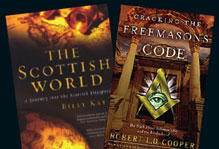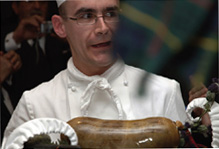Reviews of books written by Scottish Freemasons are not, as a general rule, promoted by the Grand Lodge of Scotland but reviews of such books by Freemasons who are not connected in any way with the Scottish Craft are considered worthy of reporting here - be they good or bad.
The Red Triangle written by a fairly well known Scottish Freemason is reviewed here by an American Freemason with no connection with the Grand Lodge of Scotland and is taken from an American magazine ' The Northen Light ', Vol. 42, No. 4, November 2011.
The Red "Triangle - A History of Anti-Masonry"
by Robert L.D. Cooper.
Published in 2011 by Lewis Masonic, an imprint of Ian Allen Publishing Ltd., Hersham, Surrey KT12 4RG, England.
Robert Cooper has served for many years as the curator of the Grand Lodge of Scotland's Library and Museum and has authored numerous books but is perhaps best known for his opinions on Rosslyn Chapel. The Red Triangle documents his personal observations and opinions on the history of anti-Masonry. He uses the term masonophobia to encompass anti-Masonic rhetoric and actions throughout its history. I am not sure of the origin of the term, but a phobia is defined as an irrational fear or dread, and I am not convinced that all anti-Masonic activity is a result of an irrational fear. Nonetheless, he has written a very compelling history of the progression of the subject in the small democratic country of Scotland since his greatest knowledge on the subject is with that Grand Lodge, and, Scotland being a small country, is more easily studied. However, this study could very easily be a study in macrocosm of what has happened or could happen to Freemasonry in the rest of the world.
The first chapter deals with the early history of Freemasonry in order to lay the foundation of the craft and probable reasoning that led to masonophobia. In it he clarifies the emphasis placed on toleration along with its non-dogmatic position on religion and politics. He points out that some of the early leaders of Freemasonry attempted to create a society without divisions and would, therefore, have no need of intervention of religious or political intermediaries and consequently be troubling to those whose very livelihood depended on that intervention.
The author implies that this could have been the cause for the early anti-Masonic feeling in the religious or political establishments since controlling people's activities is inherent in their professions and Freemasonry was not within the political or religious system.
As one might expect a great portion of the book deals with the anti-Masonic activities promulgated during World War II and, more specifically, those of the Nazi regime. Cooper goes to great lengths to document that many of the Freemasons who were put to death during this period of history met their fate simply because they were Freemasons and not because they also fit into another persecuted niche.
Cooper delves quite thoroughly into the more recent attacks by the press condemning Freemasons based upon a perception as to what Freemasonry is rather than on actuality as to what Freemasons do. He offers a good defense of the craft simply by asking the question: If Freemasonry is guilty of all of the accusations proposed by the press, why have they not brought that evidence to the legal authorities?
This is a book not written for the enjoyment of reading but rather as a cautionary history lesson of what can happen when there is irrational fear, religious bigotry and unrestrained government, often driven by the news media, even in a democratic society.
It does become somewhat repetitious, but I recommend its reading for the knowledge of anti-Masonic attacks as well as acquiring information for a defensive posture should they be encountered. The only problem I have with the book is the dust cover. The title and a red triangle pointing down to a Masonic emblem caused me to cover it while I was reading on an airplane. I felt it was subject to misinterpretation by a casual observer. Cooper has spent considerable effort researching this unfortunate segment of Masonic history and it is worth the effort to read.
Thomas Jackson.
The book can be ordered online from the Grand Lodge of Scotland online shop:



